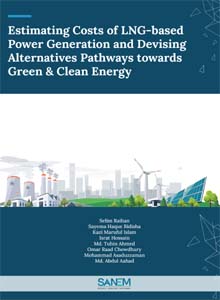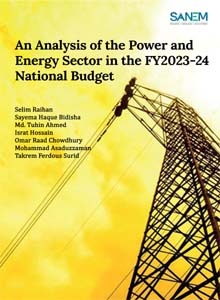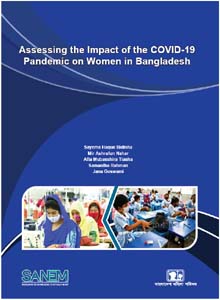
Impact of COVID-19 on Labour Market and Migration in Bangladesh
 Citation: Raihan, S., Bidisha, S. H., Uddin, M., Ahmed, M. T., Nahar, M. A. & Ahmmed, S.(2022). Impact of COVID-19 on Labour Market and Migration in Bangladesh: Results from SANEM’s Nationwide Employment Survey Conducted in January-February 2021. SANEM Publications, Dhaka, Bangladesh
Citation: Raihan, S., Bidisha, S. H., Uddin, M., Ahmed, M. T., Nahar, M. A. & Ahmmed, S.(2022). Impact of COVID-19 on Labour Market and Migration in Bangladesh: Results from SANEM’s Nationwide Employment Survey Conducted in January-February 2021. SANEM Publications, Dhaka, Bangladesh
Although COVID-19 was primarily a health risk, the lockdown that was imposed as a precaution to contain the spread of the virus caused severe economic crises all over the world. The situation was no different for Bangladesh. Many people in Bangladesh, particularly women workers, lost their jobs permanently or temporarily and experienced their wages drastically reduced. Moreover, many migrant workers were fired and sent back to Bangladesh, forcing aspiring migrants to postpone their travel plans. This exacerbated the labour market situation in Bangladesh. Against this backdrop, the study seeks to understand labour market dynamics in pre- and post-COVID contexts. In this respect, SANEM surveyed 3,348 households in 2021 in all 8 divisions and 64 districts. Of the total 3,348 households, 2845 were non-migrants, 230 were internal migrants and 273 were international migrant households. In 2018, SANEM in collaboration with the General Economic Division (GED), Planning Commission, Ministry of Planning, Bangladesh, surveyed 10,500 households across all 8 divisions and 64 districts. The basis of the 2021 survey was the 2018 SANEM-GED survey and households were sampled from that list. The 2021 survey was conducted over the phone from January to February 2021. The survey shows that both self-employed and wage-employed individuals were impacted by the pandemic from March to December 2020, but not equally. Most self-employed faced a decline in their production, sales or profits, and over half had to temporarily close their businesses. More than half of the wage workers saw salary cuts. As health and caregiver workers, women were disproportionately impacted by the pandemic. Jobs in Dhaka were hit hard. On top of that, 14% of internal migrants and 20% of international migrants lost their jobs between March 2020 and December 2020. The study also highlighted policy measures such as implementing backstop programs for skills development and job creation.



